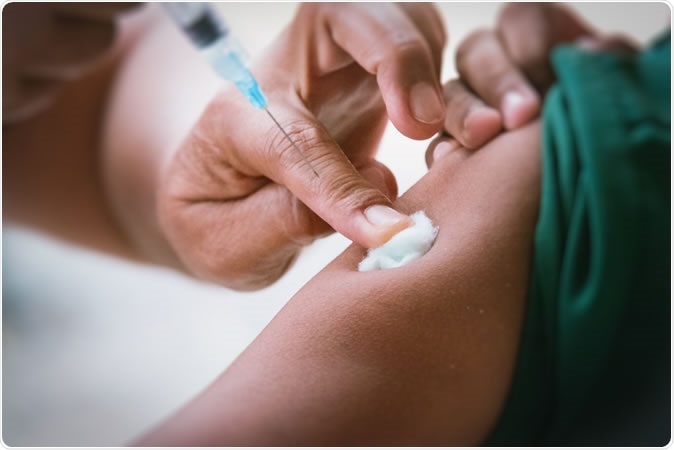A new typhoid conjugate vaccine (TCV) that has been approved by the World Health Organization (WHO) Global Advisory Committee on Vaccine Safety has proved extremely effective in both young children and adults in a high-endemicity area for the first time. With almost 82% of recipients showing protection against typhoid, the vaccine promises to help control this deadly disease that claims up to 160,000 of its 11 million victims each year.
The TCV was carried out in Nepal, using a vaccine produced by Bharat Biotech, Hyderabad, India. By proving its efficacy, the test “provides the first evidence of the level of impact and the potential for improving the health of children in some of these very vulnerable populations around the world.” The research, titled 'Phase 3 Efficacy Analysis of a Typhoid Conjugate Vaccine Trial in Nepal', is published in the New England Journal of Medicine.

Image Credit: PanyaStudio / Shutterstock
Typhoid
Typhoid is a food-borne illness caused by Salmonella typhi bacteria, involving food or water contaminated with typhoid bacteria from feces, through houseflies or improperly washed hands. It is a huge problem in many parts of the world with poor sanitation facilities and lack of potable water, as well as poor cooking hygiene. The sick person typically presents with a long course of fever, headache, loss of appetite, nausea, or constipation. Patients may remain ill for weeks or even months unless properly treated, and this may cause impaired immunity to other infections, severe malnutrition, and other complications. About 1% of patients die due to internal hemorrhage from a perforated gut, or other severe sequelae.
This could go up to 20% if the current drug-resistant strains proliferate, warns Seth Berkley of Gavi, the Vaccine Alliance.
Many families wear themselves out trying to get the money to have their family members treated for the disease, due to the lack of access to proper medical facilities and the cost of antibiotics.
Now, some of the bacterial strains that cause this disease are showing antibiotic resistance, especially in South Asia. This makes it difficult to control its spread as well as to treat it adequately. Pakistan is an epicenter of such extensively drug-resistant (XDR) strains. One of these has already infected 10,000 people beginning in the province of Sindh in November 2016.
Young children unprotected by vaccine
Earlier typhoid vaccines are not suitable for very young children, who are especially vulnerable to the illness. One of them comes as a large capsule that cannot be swallowed by small children. It can therefore be used only in those older than 6. Another is injectable but doesn’t protect children aged below 2 years. Travelers from non-endemic countries who travel to endemic regions with young children cannot therefore protect their families against this disease. Instead, they must be on the watch constantly to make sure their children don’t drink improperly boiled or unfiltered water and eat only well-cooked and hygienically served food.
The trial
With the new vaccine, things are different. Children only 9 months of age were involved in the trial. Over 10,000 children were vaccinated in Lalitpur, in Kathmandu Valley, Nepal, where typhoid is endemic. Another 10,000 were vaccinated with meningococcal vaccine in order to provide a control group. One dose was given in each case.
Children who had at least two-day fevers visited any of 18 clinics or the Patan Hospital for diagnosis of typhoid by blood cultures. The families were also called once in 3 months to identify any new cases and to record any side effects of vaccination.
The results
The vaccines took about one month to provide protection. There were 38 cases of typhoid among the 10,000 children who received meningococcal vaccine, but only 7 among those given TCV. The rate of reported adverse events was similar for both groups. About 5% of children in either group had fever within a week of the vaccination.
The follow-up will continue for a year to find out just how long the protection lasts. Similar field tests to be continued for two years are going on in Bangladesh and Africa to test the efficacy of the vaccine in these surroundings.
The TCV was first tested in Oxford, asking people to drink typhoid bacilli in a bicarbonate solution so they would be infected, after first vaccinating them. This showed a high degree of protective efficacy.
Providing confidence
The second phase now in full swing is testing the real-time efficacy of the vaccine in countries with a very high incidence of the disease naturally. Calling these implementation and impact studies, the researchers say these tests are to inspire confidence in field staff about the implementation of vaccination in the child population aged 9 months to 15 years. The 9 months cut-off was chosen since this is when the measles vaccine is given. These field trials also reveal how useful it can be, since it is a huge victory to prevent over 80% of potential typhoid cases in a setting where the victims number in the hundreds of thousands.
In Pakistan’s Sindh, the seat of the XDR strain, 9 million children will receive the vaccine, which is being paid for by Gavi, making Sindh the first province in the world where typhoid is added to the routine childhood vaccination schedule. Typhoid Vaccine Acceleration Consortium’s Kathleen Neuzil says the vaccine could "reduce disease and save lives in populations that lack clean water and improved sanitation". Indeed, the new vaccine promises to not just prevent the disease but drug resistance as well by restricting the spread of the new XDR strain.
Journal reference:
Phase 3 Efficacy Analysis of a Typhoid Conjugate Vaccine Trial in Nepal List of authors. Mila Shakya, M.P.H., Rachel Colin-Jones, M.A., Katherine Theiss-Nyland, Ph.D., Merryn Voysey, D.Phil., Dikshya Pant, F.C.P.S., Nicola Smith, M.B., B.Chir., Xinxue Liu, Ph.D., Susan Tonks, B.Sc., Olga Mazur, B.Sc., Yama G. Farooq, M.Sc., Jenny Clarke, Ph.D., Jennifer Hill, Ph.D., et al., for the TyVAC Nepal Study Team, https://www.nejm.org/doi/full/10.1056/NEJMoa1905047